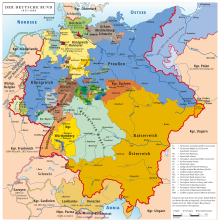Mission Gablenz
As Mission Gablenz (or: Gablenz plan ) is known in the science of history an attempt to mediate between Austria and Prussia in April and May of 1866. Anton von Gablenz was a former Saxon Chamberlain and Prussian state representative and brother of General Ludwig von Gablenz , the Austrian Governor in Holstein . He had visited Berlin and Vienna several times and adjusted his suggestions in the process.
The mission failed due to Austria's lack of interest in working with Prussia to regulate the situation in Germany anew. Conversely, Prussia also lost confidence in the possibility of cooperation. At the time of the negotiations, both sides had already mobilized their troops. In June 1866 there was a complete break between the two German great powers and then the German War .
proposals
The two main points of contention between Austria and Prussia were the conditions in Schleswig and Holstein and a reform of the German Confederation . After the German-Danish War in 1864, Denmark ceded the duchies of Schleswig , Holstein and Lauenburg (sometimes referred to as " Elbe duchies " in Germany ) to Austria and Prussia; But Prussia was interested in annexing both. In the German Confederation , Prussia wanted to be at the top on an equal footing with Austria, for example by dividing the federal territory into spheres of influence.

Gablenz's proposals largely corresponded to Prussian ideas. Schleswig-Holstein should become an independent member state in the German Confederation. A Prussian prince would become a duke. The new member state could then sign a military convention with Prussia. Austria would receive 20 million thalers for its war costs in 1864 and another 5 million for the Kiel war port . The Federal War Constitution was to be amended so that Prussia in northern Germany and Austria in southern Germany received supreme command of the federal army , including the troops of Prussian Hohenzollern .
The Prussian Prime Minister Otto von Bismarck adopted Gablenz's suggestions on May 4, 1866 as a basis for discussion. However, he demanded that Austria not turn to the Bundestag because of its ownership claims in Schleswig-Holstein . On May 25, Bismarck's offer to Austria looked like this: France's Emperor Napoleon III. had proposed a European mediation congress. Austria should agree to it, but conclude a secret agreement with Prussia. If then Napoleon at the congress demands that Austria cede Veneto to Italy, Austria would leave the congress. Then Austria and Prussia could jointly reorganize Germany, even against the will of France or the German medium-sized states (such as Bavaria, Hanover and others). However, three days later the Austrian emperor rejected this plan.
In return, Austria demanded that Prussia support Austria in the event of war against Italy. It was also against a Prussian counter-proposal that the Prussian king should permanently become the federal general of the federal army. That would have diminished Austria's reputation among the medium-sized states even more.
rating
Bismarck later expressed his regret that the Gablenz mission had failed, since the German war could have been avoided on the basis of the proposals. However, Andreas Kaernbach judges, with such a radical change Bismarck would have made cooperation with France and Italy impossible. This only made sense if Austria had largely accepted the Prussian proposals for the reorganization of Germany.
Bismarck's proposal was less of a fully-fledged plan than a final attempt to facilitate negotiations with Austria. Austria, on the other hand, at least the emperor, did not want a war, but (unlike Bismarck) did not seek further negotiation options. It also rejected Napoleon's idea of a European congress because it was not interested in mediation. Kaernbach suspects that Vienna was wrongly assumed that there was political unrest in Berlin and that Bismarck's fall was imminent.
See also
Individual evidence
- ↑ George O. Kent: Bismarck and His Times . Southern Illinois University Press: Carbondale 1978, p. 59.
- ^ Ernst Rudolf Huber: German constitutional history since 1789. Volume III: Bismarck and the realm. 3rd edition, W. Kohlhammer, Stuttgart a. a. 1988, p. 527.
- ^ Andreas Kaernbach: Bismarck's concepts for reforming the German Confederation. On the continuity of the politics of Bismarck and Prussia on the German question. Vandenhoeck & Ruprecht, Göttingen 1991, pp. 229/230.
- ↑ George O. Kent: Bismarck and His Times . Southern Illinois University Press: Carbondale 1978, p. 59.
- ^ Andreas Kaernbach: Bismarck's concepts for reforming the German Confederation. On the continuity of the politics of Bismarck and Prussia on the German question. Vandenhoeck & Ruprecht, Göttingen 1991, p. 230.
- ^ Andreas Kaernbach: Bismarck's concepts for reforming the German Confederation. On the continuity of the politics of Bismarck and Prussia on the German question. Vandenhoeck & Ruprecht, Göttingen 1991, pp. 230/231.
